Alumni Success Stories
Christine Bennett Flon
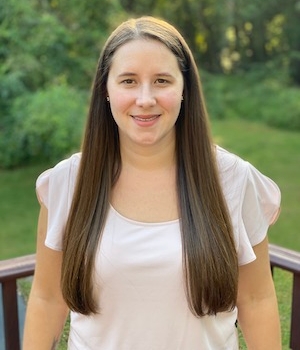
Research Analyst in the Office of Institutional Research at Ramapo College of New Jersey
A decade ago, if you were to ask Christine Bennett Flon, ‘11, about what she would be doing now, her answer would not have been what she is doing now, but she’s happy with her choice, prompted by research collaboration with Scranton faculty.
Upon enrolling at the University, she was unsure about a career path. She started as an undeclared major and took time to figure out what she enjoyed, before settling on a psychology major.
“It was a great experience because I was able to try a bunch of different stuff, and I knew that I liked psychology,” Flon said. “Starting out as an undeclared major gave me the ability to explore different areas of study.”
Karen Hudzinski
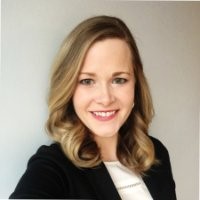
M.S. in Consumer and Industrial Psychology, Cleveland State University
Current Position: Manager, Consumer Insights and Engagement, Macy’s
“One highlight of my experience as a psychology major was the time I spent on research projects with my mentor. I spent two summers experimenting in the field with how different verbal requests influence a person’s willingness to comply with those requests. This was a highlight because it allowed me to put into practice everything I learned about experimental design and data analysis.
My experiences in the Psychology Department also helped me realize it’s OK to take the path others might not be taking. Unable to squelch my passion for consumer behavior, I spent lots of time contemplating with my mentor about what my next move should be and began reaching out to professionals in the consumer behavior field whom I did not know. Pushing myself to pursue my passion is one of the reasons I am on the career trajectory that I am today.
It is extraordinarily clear how accomplished and talented the professors are in the Psychology Department. It is not only through degrees and publications, but also through the quality of their teaching and interest in the development of their students. I felt as though they took a personal approach to my success. They did not want to just hand out degrees, but rather they wanted to help shape a young professional – and they enjoyed doing it!”
Paul Krebs, Ph.D. '01
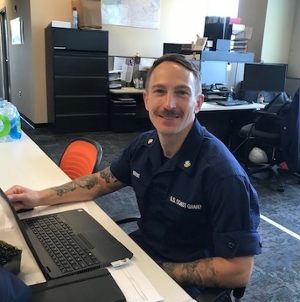
Helping People Quit Smoking and Researching Behavior Change
Paul Krebs, Ph.D. ’01 is a clinical psychologist interested in what motivates human behavior and how people change those behaviors -- so a psychology major at Scranton was a perfect fit.
He started his college career at Scranton in a different major, but he changed his mind after a long conversation in the dining hall with one of the Psychology Department professors.
“He sat down with me and said, ‘Tell me about your career goals and what you want,’ and he told me I have a scientific mind, so I thought, ‘Maybe I’ll investigate psychology a little more,’” Krebs says. “Scranton set the stage for what I should expect from mentoring relationships. It was great. It was the small class sizes with the personalization, the kindness. I realized afterwards that it is rare.”
Megan Hosey Mastalerz
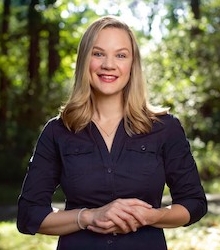
Supporting ICU Patients During Hospital Recovery and Beyond
Megan Hosey Mastalerz, Ph.D. ’05 doesn’t want patients to put their lives on hold during a hospital stay, even the ones with critical illnesses she cares for in the ICU. As a rehabilitation psychologist, Mastalerz helps patients recover in the hospital by integrating their lives at home into her treatment plan, whether that’s using a therapy dog or finding a patient’s favorite band and hosting a pick-me-up dance party.
Jennifer McLaren

Psy.D. in School Psychology, Alfred University
Current position: Director of Evaluations and Outpatient Services, The Center for Autism, Philadelphia
Licensed psychologist, Certified School Psychologist
“The University of Scranton’s professors in the psychology department are dedicated, passionate, and supportive. Scranton is unique because faculty regularly mentor undergraduate students as research and teaching assistants; opportunities that may not be available at larger universities with graduate programs.
The University of Scranton provided me with several opportunities in research as well as clinical practica to prepare me for a doctoral program. As a result of these one-on-one and small group experiences with faculty, I was one of only two students in my graduate program who transitioned directly from an undergraduate program into a doctoral program. Dr. Norcross literally wrote the book on preparing undergraduate psychology majors to transition into graduate programs and helped me to make this leap.”
Mark O'Malia
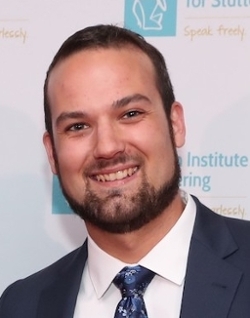
Speech-language pathologist at the American Institute for Stuttering
As he considered possible careers while still in high school, Mark O’Malia knew he wanted to work with people in some capacity.
He didn't have any clearer ideas, though, until he took an AP Psychology course during his senior year – and fell in love with the course material. That set the Wilkes-Barre native on a path to The University of Scranton, where he earned a bachelor’s degree in psychology with honors in 2014.
O’Malia now works as a speech-language pathologist at the American Institute for Stuttering, a role he calls his dream job.
“I am someone who stutters myself, and it’s something that I’ve experienced my whole life. I struggled with it growing up and it hindered my self-confidence,” O’Malia said. “I wasn't true to myself.”
Ryan Pohlig
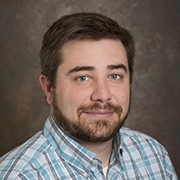
Ph.D. in Research Methodology, University of Pittsburgh
Current Position: Manager, Biostatistics Core, College of Health Sciences, University of Delaware
“I fondly recall the interactions shared with Psych faculty members, who treated the students with a respect and dignity not often found in higher education. Being involved in the Psych Department’s social groups exposed me to a lot of experiences I would have never had.
The University facilitated a tremendous amount of personal growth. The faculty and their classes stressed critical thinking, personal responsibility, and a strong sense of ethics. My time as a psychology major is literally the foundation that my academic life has been built upon.
The faculty and supporting staff in the Psychology Department are incredible. It is not often that primarily teaching universities have a department with faculty who have national reputations for being quality researchers. Added to that is that they genuinely care. The Department consistently put the student first. My faculty mentors convinced me that graduate school was realistic and an opportunity I should take; they gave me the push I needed.”
Vanessa Relvas

Elementary school psychologist in the Red Clay Consolidated School District in Elsmere, Delaware
Like any other wide-eyed, 18-year old freshman, Vanessa Relvas ’12 didn't know exactly what she was in for when she stepped onto Scranton’s campus more than a decade ago.
But she had an inkling that her experience over the next four years would prove life-changing.
“I knew Scranton had a really good (psychology) program, and I really liked the intimacy of the (campus) environment and getting individualized attention (in class),” Relvas said recently from her home in Hatboro.
Laura Rozelle
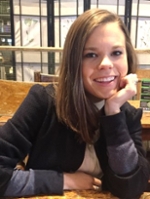
Ed.M. in School Psychology, Columbia University
Current Position: School Psychologist, MaST Community Charter School
“My time at Scranton continues to impact my everyday life in critical thinking skills, scientific methods, and the way I interact with my students and colleagues. My psychology classes at Scranton taught me to critically evaluate and analyze data to develop ways to help students academically, socially, and emotionally.
Throughout my time at Scranton, I expanded my knowledge of behavioral and mental processes, gained hands-on experience, and participated in Jesuit and service-related activities. These opportunities thoroughly prepared me for my academic and professional work in psychology as I was challenged to strive to reach my highest potential.
I encourage parents to consider sending their children to Scranton, particularly if they have an interest in psychology. Psychology challenges students to grow academically while providing a tremendous amount of support. In addition, the Department embraced me for who I am and encouraged me along a career path for my strengths and abilities. I feel strongly that this University and this academic department are unique in their ability to build community while challenging students to strive for excellence.”
Allison Smith
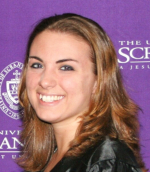
Ph.D. in Clinical Psychology, University of Rhode Island
Current position: Attending Psychologist, Mayo Family Pediatric Pain Rehabilitation Center / Clinical Faculty Member, Harvard Medical School
“As a student at Scranton, I felt like I was part of something bigger than myself. In this department, I knew I mattered and had a community of people who would delight in my successes and support me through challenges. Psychology felt like more than a building or a major; it felt like being part of a family.
Perhaps my favorite memory was attending my first psychology conference with my mentor. She watched my eyes light up as we walked in and said, “You are totally meant to do this.” This statement resonated in my mind and heart for the rest of my undergraduate career, during overwhelming moments in graduate school, and to this day, in the midst of the most challenging cases. She, and the department, gave me a foundation, a vision, and the confidence to pursue the professional life meant for me.
The Psychology Department’s blend of science and practice not only provided me with the strongest foundation for graduate school, but taught me how to think critically, be ever curious, and cultivate empathy. Faculty members are not just teachers – they educate whole-heartedly and they care deeply.”
Daisy Velez
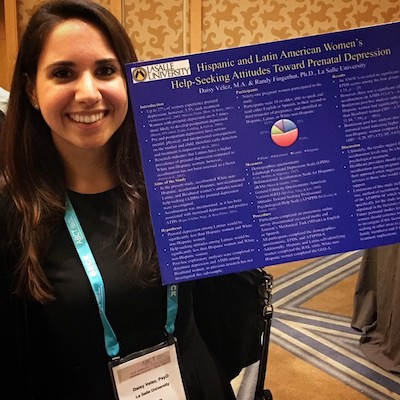
Attending medical psychologist for the trauma unit at Cooper University Hospital in Camden, New Jersey
Perhaps now more than ever, mental health is at the forefront of conversations in the United States. It has become more accepted and more common for people to acknowledge problems they may be dealing with – and to seek treatment.
Daisy Velez, Psy.D. ’09, is among those who have dedicated their lives to improving people’s psychological well-being.
Velez recently became the attending medical psychologist for the trauma unit at Cooper University Hospital in Camden, New Jersey. Velez calls it her dream job.






